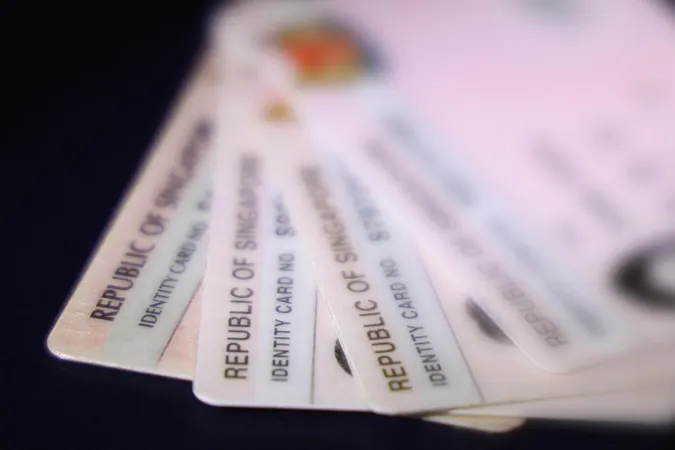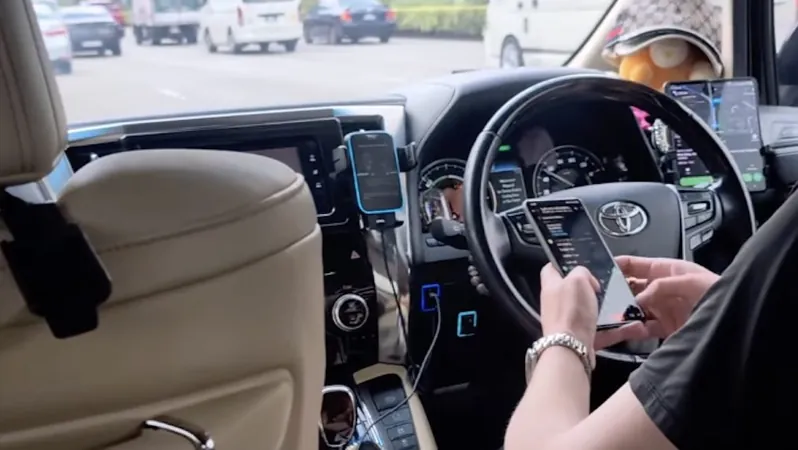
Major Cybersecurity Breach: NRIC Numbers Exposed, Putting Personal Data at Risk
2024-12-20
Author: Yu
Introduction
In a startling revelation, Singaporeans have been warned of potential cybersecurity threats following a significant leakage of NRIC numbers from the Accounting and Corporate Regulatory Authority's (Acra) database earlier this month. The incident, reported on December 9, occurred due to a malfunction on their new Bizfile web portal, which inadvertently allowed individuals to view the full NRIC numbers of registered company representatives – raising urgent concerns about privacy and security.
Implications of the Exposure
Cybersecurity experts are now raising alarms over the implications of this exposure. The NRIC number, often used as a gateway to access personal data, can enable malicious actors to conduct targeted scams, impersonating authority figures to steal sensitive information or facilitate fraud. With criminals now having access to these key identifiers, individuals are urged to remain vigilant and informed about potential risks.
Backlash Against Acra
Acra has faced backlash for the incident and has since disabled the feature that allowed public access to the NRIC numbers. However, cyber experts warn that the data may still be cataloged by fraudsters using existing algorithms, significantly heightening the likelihood of scams. The authority has not disclosed the total number of leaked NRICs, leaving many concerned about the extent of the breach.
Government Response
In an effort to mitigate these security concerns, Minister for Digital Development and Information, Josephine Teo, announced on December 19 that the government will accelerate public education on NRIC usage and consult with private sectors about robust alternatives for authentication. She emphasized the need for organizations to abandon the over-reliance on NRIC numbers for identity verification, particularly during sensitive transactions like fund transfers.
Health Sector Vulnerabilities
The repercussions of the leaked NRIC numbers extend beyond mere identity theft. Investigations reveal that health institutions in Singapore still utilize NRIC numbers for various functions, such as retrieving patients’ registered addresses, recent appointments, and even medical bills at e-kiosks. This information could easily be exploited for malicious intents, like booking fraudulent medical appointments or misusing prescriptions.
Banking Sector Adjustments
In light of these events, many banks have started reviewing their internal protocols that rely on NRIC numbers. While it is common for banks to use NRICs for identifying customers needing transaction assistance or account freezes, this incident highlights serious security concerns. A recent case where a couple's credit cards were unfairly blocked while on holiday due to impersonation demonstrates the fine line between security convenience and potential risk.
Guidance from Authorities
As banks and insurance companies reassess their practices regarding the use of NRIC numbers, guidance from the Ministry of Digital Development and Information suggests that full NRIC numbers should only be employed in situations requiring genuine identity verification, such as hotel check-ins or medical appointments, rather than for retail services or promotional giveaways.
Expert Recommendations
Cybersecurity experts emphasize that organizations must intensify their cybersecurity measures and pivot away from NRICs as a reliable method for authentication. Shane Chiang, a cybersecurity consultant, advises that individuals should remain proactive by implementing two-factor authentication across their online platforms and being cautious of phishing attempts likely to escalate as fraudsters hone in on the exposed personal data.
Conclusion
This breach has undoubtedly cast a shadow over the confidence Singaporeans place in their personal data security. As the city-state navigates these challenges, both individuals and organizations must adapt swiftly to enhance their cyber hygiene and protect sensitive information from nefarious exploitations.




 Brasil (PT)
Brasil (PT)
 Canada (EN)
Canada (EN)
 Chile (ES)
Chile (ES)
 España (ES)
España (ES)
 France (FR)
France (FR)
 Hong Kong (EN)
Hong Kong (EN)
 Italia (IT)
Italia (IT)
 日本 (JA)
日本 (JA)
 Magyarország (HU)
Magyarország (HU)
 Norge (NO)
Norge (NO)
 Polska (PL)
Polska (PL)
 Schweiz (DE)
Schweiz (DE)
 Singapore (EN)
Singapore (EN)
 Sverige (SV)
Sverige (SV)
 Suomi (FI)
Suomi (FI)
 Türkiye (TR)
Türkiye (TR)